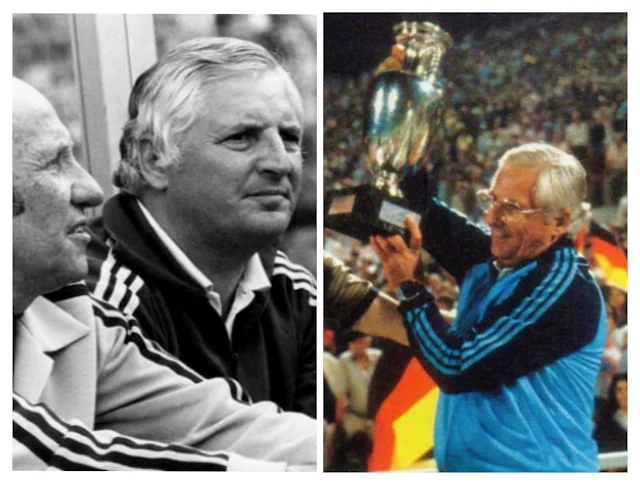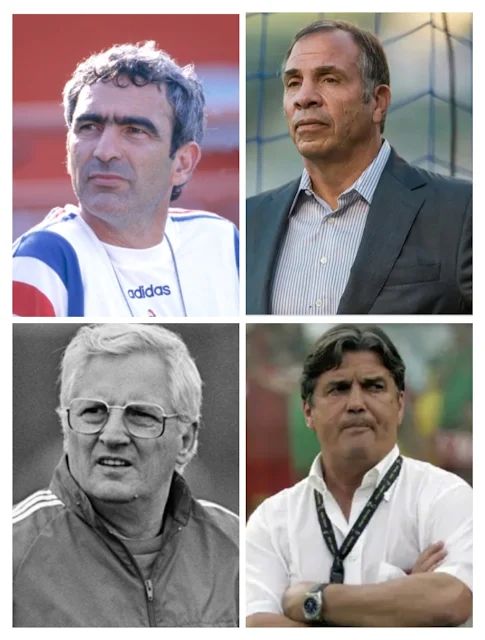Only a few former Olympic team managers appointed to take charge of the
senior team were considered the best one in history.
The Paris Olympics 2024 are getting closer. The multi-event sport tournament
starts its competition on July 26, but football starts slightly earlier on July
24 due to its stages in the competition. All 16 managers are still pondering
who will be named in the final squad and which over-aged player can be called
up and given permission by their clubs to compete in the Olympics, the global
tournament that is not included in the FIFA calendar.
So far, only the host France U23 and Argentina U23 have called up their players for the final squad. Les Blues have included Crystal Palace man Jean
Philippe Mateta and former Arsenal man Alexander Lacazette as their only
over-aged players enlisted in the team. France is led by Thierry Henry, while
Albiceleste currently has Javier Mascherano at the helm of the team. Both are
still at the early stages of their managerial careers. Henry is hired with the
target of winning gold medal, while Mascherano has been part of the Argentina
youth team since 2021. Should they manage to win medals or at least have a
fairly successful campaign, they could be promoted to take charge of the senior
team in the future.
Recently, two notable former Olympic team head coaches have been promoted to
the top level. Spain and Mexico bosses, Luis De la Fuente and Jaime Lozano are
perfect examples. They have been appointed to lead the senior team after their
success in the 2020 Tokyo Olympics, where Spain and Mexico reached the final
and semifinal, respectively. Here are the other managers who were in the
same circumstances but managed to do well in the senior side.
Jupp Derwall (West Germany)
Derwall was at the helm of the West German Olympic team in 1972. At that
time, he also served as the assistant manager of Helmut Schon, the West Germany
national team boss, a position he held until 1970. The former Fortuna
Dusseldorf man led the team with the young Ottmar Hizfield and Uli Hoeness in
the squad in the tournament but did not have an impressive campaign, despite
being the host. They only managed to progress to the last eight in the
second-round group stage. Being seeded with East Germany, Mexico, and Hungary,
Derwall’s men were only able to snatch one point and sit third in the final
standings.
Despite his team’s dismal result, the Wurselen-born gaffer was promoted as
Helmut Schon’s successor in 1978. He passed the first test as a head coach well by winning EURO 1980 with Bernd Schuster, Karl Heinz Rummeniege, Horst Hrubesch, and Klaus Allofs. In his first World Cup two years later, Derwall
guided Germany to the final despite losing to Algeria in the opener. His last
major tournament was EURO 1984, which they headed to exit prematurely.
Henri Michel (France)
He was the head coach for the French Olympic team in Los Angeles in 1984.
That was the first edition when professional players were allowed to be called
up for the squad. Yet, only those with minor caps or less than five
international appearances on the senior team, regardless of age, were given
clearance to play at the Olympics. Michel had RC Lens’ Daniel Xuereb and Guy
Lacombe in the squad. Les Blues managed to go all the way to the final and beat
the favourite, Brazil, by two goals to nil.
Not long after, he was promoted to replace Michel Hidalgo after EURO 1984.
Michel had the luxury of having top players in the national team like Michel
Platini, Jean Tigana, Alain Giresse, and Luis Fernandez at his disposal. His
team once again defeated Brazil in the 1986 FIFA World Cup quarterfinal before
slumping to a 2-0 loss against West Germany in the semifinal. Michel Platini
and Co. finally secured third place in Mexico in 1986. Unfortunately, Prance
failed to qualify in Italy in 1990.
The former midfielder then left the position and took charge of PSG for the
1990–91 campaign. Sadly, Le Parisien only finished ninth in the standings.
Michel then became a journeyman in Africa and led three nations to three
different World Cup editions: Cameroon in the USA 1994, Morocco in France in
1998, and Ivory Coast in Germany in 2006.
Raymond Domenech (France)
Domenech was a surprising figure in French football. Yet he had his fortune
during his time. The former Strasbourg man was at the helm of the French
Olympic team in Atlanta in 1996. Les Blues had notable names in the squad, such
as Vincent Candela, Olivier Dacourt, Sylvain Wiltord, Robert Pires, and Claude
Makalele. All of whom became stars in their own clubs and the France national
team in the 1998 FIFA World Cup, EURO 2000, and 2006 FIFA World Cup.
Unfortunately, Domenech’s men only advanced to the quarterfinal as they were
beaten by Portugal 2-1 through a golden goal.
After France’s exit from EURO 2004, the former fullback was once again
shockingly picked to lead the senior team ahead of the 2006 FIFA World Cup.
With the help of Makalele, plus Zidane and Lillian Thuram, who had announced
their international retirement, Les Blues was able to go through the final.
Unfortunately, Les Blues’s luck ran dry in the summit as they lost on penalties
after their skipper, Zinedine Zidane, headbutted Marco Materazzi, leading to
his expulsion and the tragic end of his career.
Unsurprisingly, Domenech failed to replicate their positive campaign in EURO
2008 and 2010 FIFA World Cups. France were both eliminated in the preliminary
round. The manager who was infamous for his controversy was eventually sacked.
His last team in charge was Nantes in 2020, ten years after his dismissal by
FFF. Yet, he only lasted for months as they struggled in the relegation
zone.
Bruce Arena (USA)
The last one on the list is the American former manager of the USMNT, Bruce
Arena. He was the head coach of the USA Olympic team in Atlanta in 1996.
However, unlike Domenech, he was not able to guide his team to progress from
the group stage, despite having notable over-aged figures like Alexi Lalas and
Kasey Keller and young talents such as Claudio Reyna, Eddie Pope, and Frankie
Hedjuk in the squad. Being seeded by the favourites, Argentina, Portugal, and
Tunisia, Alexi Lalas and Co only finished third with four points, from a win
over Tunisia and a draw against Portugal, but lost to Albiceleste.
Two years later, after taking the reins in MLS’s DC United, Arena was named
USMNT boss after their early disappointing exit in the 1998 FIFA World Cup. The former goalkeeper had been able to bring the USMNT to the quarterfinals of the 2002 FIFA World Cup, their highest stage to date in modern football.
Unfortunately, he could not repeat the same success in Germany in 2006, leading
to his dismissal.



Comments
Post a Comment